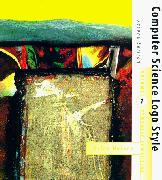Computer Science Logo Style volume 1:
Symbolic Computing 2/e Copyright (C) 1997 MIT
Computer Science Logo Style
Volume 1: Symbolic Computing
Brian Harvey
University of California, Berkeley
Below this short table of contents is an expanded table of contents
including sections within each chapter. Click on the chapter name
to jump down. You can also download the complete text of each chapter
in PDF format for elegant printing, or browse the HTML version.
Note: These books are still in copyright, and in print. They are
posted here for your personal use, not for resale or redistribution.
Thanks!
I don't know why suddenly everyone wants to translate this page to other
languages, but here they are. It's just this page, not the whole book.
View
this
page in Romanian courtesy of azoft.
Slovakian translation courtesy
of Gasper Halipovich.
Vietnamese
translation courtesy of Julia Duong from coupofy.com.
Russian
Translation Courtesy of Search-Sos.
- The Intellectual Content of Computer Programming
- Computer Science Apprenticeship
- About the Second Edition
- Why Logo?
- Hardware and Software Requirements
- Words of Wisdom
- Getting Acquainted with Logo...
- ... in Two Senses
- Another Greeting
- Fooling Around
- A Slightly Longer Conversation
- A Sneaky Greeting
- A Quiz Program
- Saving Your Work
- About Chapter 2
- No Exercises
- Procedures and Instructions
- Technical Terms
- Evaluation
- Error Messages
- Commands and Operations
- Words and Lists
- How to Describe a Procedure
- Manipulating Words and Lists
Print and Show
- Order of Evaluation
- Special Forms of Evaluation
- Writing Your Own Procedures
- Editing Your Procedures
- Syntax and Semantics
- Parentheses and Plumbing Diagrams
- Nonsense Plumbing Diagrams
- User Procedures With Inputs
- What Kind of Container?
- An Abbreviation
- More Procedures
- An Aside on Variable Naming
- Don't Call It
X
- Writing New Operations
- Scope of Variables
- The Little Person Metaphor
- Changing the Value of a Variable
- Global and Local Variables
- Indirect Assignment
- Functional Programming
- True or False
- Defining Your Own Predicates
- Conditional Evaluation
- Choosing Between Alternatives
- Conditional Evaluation Another Way
- About Those Brackets
- Logical Connectives
Ifelse as an Operation
- Expression Lists and Plumbing Diagrams
- Stopping a Procedure
- Improving the Quiz Program
- Reporting Success to a Superprocedure
- The Problem:
Initials
- One Solution: Numeric Iteration
- Critique of Numeric Iteration
- What's a Function?
- Functions of Functions:
Map
- Higher Order Selection:
Filter
- Many to One:
Reduce
- Choosing the Right Tool
- Anonymous Functions
- Higher Order Miscellany
- Repeated Invocation:
Cascade
- A Mini-Project: Mastermind
This program plays the game of Tic Tac Toe against the user. It follows a
perfect strategy, so it always wins or ties.
- The Project
- Strategy
- Program Structure and Modularity
- Data Representation
- Arrays
- Triples
- Variables in the Workspace
- The User Interface
- Implementing the Strategy Rules
- Further Explorations
- Program Listing
- Starting Small
- Building Up
- Generalizing the Pattern
- What Went Wrong?
- The Stop Rule
- Local Variables
- More Examples
- Other Stop Rules
- Recursive Patterns
- The Leap of Faith
- The Tower of Hanoi
- More Complicated Patterns
- A Mini-Project: Scrambled Sentences
- Procedure Patterns
- Tricky Stop Rules
- Little People and Recursion
- Tracing
- Level and Sequence
- Instruction Stepping
- A Review, or a Brief Introduction
- Local vs. Global Descriptions
- The Turtle's State
- Symmetry
- Fractals
- Further Reading
- A Simple Substitution Cipher
- More Procedure Patterns
- The
Filter Pattern
- The
Reduce Pattern
- The
Find Pattern
- Numerical Operations: the
Cascade Pattern
- Pig Latin
- A Mini-Project: Spelling Numbers
- Advanced Recursion:
Subsets
- A Word About Tail Recursion
This project demonstrates the use of a slightly complex cipher, in which a given
letter in the original text is not always represented by the same letter in
the coded version.
- Data Redundancy
- Composition of Functions
- Conversational Front End
- Further Explorations
- Program Listing
- Structured Programming
- Critique of Structured Programming
- A Sample Project: Counting Poker Hands
- An Initialization Procedure
- Second Edition Second Thoughts
- Planning and Debugging
- Classifying Poker Hands
- Embellishments
- Putting the Project in a Context
- Program Listing
This program solves the category of problems in which you are given
pitchers of certain sizes and asked to use them to measure a specified
amount of water from a river.
- Tree Search
- Depth-First and Breadth-First Searching
- Data Representation
- Abstract Data Types
Sentence as a Combiner
- Finding the Children of a Node
- Computing a New State
- More Data Abstraction
- Printing the Results
- Efficiency: What Really Matters?
- Avoiding Meaningless Pourings
- Eliminating Duplicate States
- Stopping the Program Early
- Further Explorations
- Program Listing
- Using Error Messages
- Invalid Data
- Incorrect Results
- Tracing and Stepping
- Pausing
- Final Words of Wisdom
A. Running Berkeley Logo |
(HTML)
|
- Getting Berkeley Logo
- Berkeley Logo for DOS Machines
- Berkeley Logo for the Macintosh
- Berkeley Logo for Unix
B. GNU General Public License |
(HTML)
|
Index of Defined Procedures |
(HTML)
|
MIT
Press web page for Computer Science Logo Style
Brian Harvey,
bh@cs.berkeley.edu






